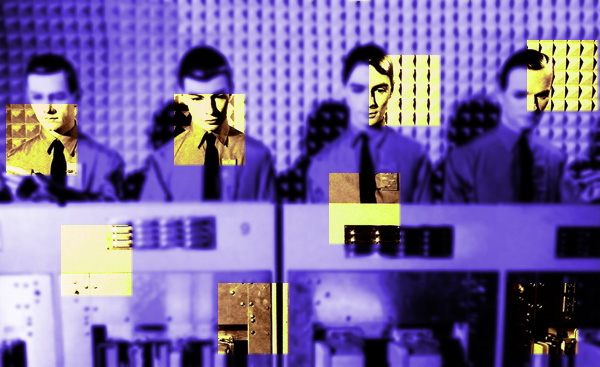 Yesterday we were examining the creative pitfalls that Kraftwerk, their genius notwithstanding, fell into. So far, their snags amounted to clinical digital synthesis/sampling, and overcooking the musical pot with Hütter’s penchant for favoring absolute control over creative play. The latter trend is largely down to what I can only perceives as an autocratic, controlling nature that over the last 38 years, has driven all of the core members out of the band, leaving only himself [and three underlings necessary for live performance] in the driver’s seat. Perhaps a bigger problem ensued since the likes of Florian Schneider, Karl Bartos, and Wolfgang Flur were never ever really sitting on that particular bicycle seat.
Yesterday we were examining the creative pitfalls that Kraftwerk, their genius notwithstanding, fell into. So far, their snags amounted to clinical digital synthesis/sampling, and overcooking the musical pot with Hütter’s penchant for favoring absolute control over creative play. The latter trend is largely down to what I can only perceives as an autocratic, controlling nature that over the last 38 years, has driven all of the core members out of the band, leaving only himself [and three underlings necessary for live performance] in the driver’s seat. Perhaps a bigger problem ensued since the likes of Florian Schneider, Karl Bartos, and Wolfgang Flur were never ever really sitting on that particular bicycle seat.
The obsessive secrecy that Ralf enshrouds the band with is indicative of an unhealthy mind. I’d bet dollars to doughnuts that he probably holds some kind of gold medal for second guessing. His reaction to the perceived threat of The Art Of Noise speaks volumes to me. Is it any wonder that Kraftwerk albums have barely trickled out over the last 30 years? And when they do leave the nest, they are compromised. Possibly due to his lack of collaborators to add the all important third mind to the creative process. Wolfgang Flur was first to leave the band in 1987. Karl Bartos followed suit in 1990. They were replaced by Fritz Hilpert and Henning Schmidt, but tellingly, only Hilpert has writing credits on the only Kraftwerk album of new material following “Electric Cafe;” 2003’s “Tour De France Soundtracks.”
Meanwhile, Karl Bartos delivered an exceptionally vibrant album “Esperanto” in 1993 under the name of Elektric Music, where he teamed with Lothar Manteuffel [Ex-Rheingold]. On it, he also collaborated with Andy McCluskey of OMD and it was my favorite album of 1993. It fairly wiped the floor with anything Kraftwerk managed to release after he left the band. It’s good to remember, Bartos is credited with co-writing half of the music on “Man-Machine” and “Computerworld.” He wasn’t just there to hit drum pads in videos.
What was Hütter’s response to this creative outburst? Stony silence, until the year 1999, when out of the blue, the band’s 1983 single was released in its original form on CD single! Well, not quite original form. It’s notable that the middle faces on the line up cyclists on the reissue are no longer Bartos and Flur; they have been airbrushed out of Kraftwerk record by Hütter in a Stalinesque flourish of revisionist history! Now that’s some attention to detail! I can’t say I would have ever thought of doing that if I were him.
The “Tour De France” single also points to a possible corruption of the group that I noticed as early as on “Computerworld.” I was amused to hear the only radio station that was playing the likes of Kraftwerk and YMO on the air when I was a youth in high school, was WOKB-AM, Tiger Radio in Central Florida. This was the “urban” station that catered to the African-American demographic since the “pop” stations there were fairly lily-white. I had first been exposed to Los Angeles Top 40 as a small boy, and I liked the funkier mix I heard. Central Florida, by comparison, was more “segregated” on the airwaves. Hearing amazing synth music like Kraftwerk and YMO’s “Computer Games” in this context was nothing that I would have expected. When I thought of funk, sure, Parliament made sense, or the likes of The Jimmy Castor Bunch. But a bunch of German nerds getting down? I didn’t see it.
But others did. And the band’s awareness of this audience began to affect them by their association after 1981 with Françcois Kevorkian, the influential French DJ/remixer whose work at Prelude Records probably brought him to Kraftwerk’s attention. He remixed their “Tour De France” single and remains associated with the group to this day. Kraftwerk are now regarded more as legends in dance music as under any other possible lens with which to view them. I’ve got nothing against dance music. I like a lot of it. But there’s no denying that there isn’t any other genre of music which is so trend conscious and thus it dates very quickly. When records like “Trans Europe Express” were blowing funky minds in America’s urban centers in the late 70s, it was an unprecedented occurrence. When African-American teens were playing the hell out of “Computerworld” in 1981, the circuit was tested and built. After that point, Kraftwerk would take this audience into account, and whenever an artist takes that factor into consideration, it invariably colors the work. Rarely is this a favorable outcome.
Next: compare and contrast…







![Record Shopping Road Trip: Visiting Liverpool + 81 Renshaw Records [Liverpool, England]](https://i0.wp.com/postpunkmonk.com/wp-content/uploads/2024/05/liv-81-renshaw.jpg?resize=200%2C200&ssl=1)
![Record Shopping Road Trip: Cob Records [Porthmadog, Wales]](https://i0.wp.com/postpunkmonk.com/wp-content/uploads/2024/05/cob-welsh.jpg?resize=200%2C200&ssl=1)


Very insightful. It is one thing to make music that inspires, but it is totally another thing to consciously make music to inspire. The former speaks to revelatory greatness, the latter speaks to not falling from the pedestal.
LikeLike
“Into Battle” by Art of Noise took music forward. “Tour De France” did not. Nothing they did afterwards meant anything to me, essentially. I looked elsewhere for inspiring music. Kraftwerk ‘lost it’. Y.M.O., Yello and even Telex moved forward. Kraftwerk descended into remixes and denial (such arrogance at acting like “Ralf & Florian”, “Kraftwerk 2” and “Kraftwerk:” literally do not exist!) I remember all during the 80’s, Toshiba Japan regularly announced a ‘new’ Kraftwerk album in Japan…only to become “re-scheduled”…and never released.
LikeLike
ronkanefiles – Well said, sir.
LikeLike